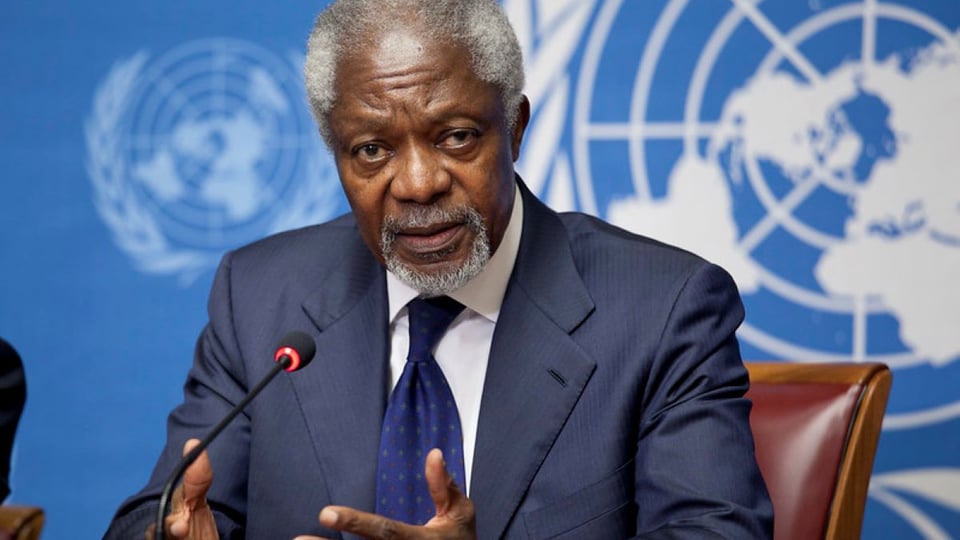Kofi Annan: A Man of Peace Who Couldn’t Bring Peace
Despite good intentions and hard work, Kofi Annan was unable to bring peace to the world. Will the United Nations’ goals of harmony between nations and universal human rights ever be achieved?

On Aug. 18, 2018, Kofi Annan died. Mr. Annan was the under-secretary-general for peacekeeping for the United Nations (UN) in the 1990s. Later he served two terms as UN secretary-general (1997 to 2006) and was the first black African to lead the organization. He received the Nobel Peace Prize in 2001 for his efforts with the UN.
After his death, people around the world paid tribute to Mr. Annan, including former U.S. Presidents George W. Bush and Barack Obama. Mr. Bush wrote: “Kofi was a gentle man and a tireless leader of the United Nations. His voice of experience will be missed around the world.” Mr. Obama wrote: “His integrity, persistence, optimism, and sense of our common humanity always informed his outreach to the community of nations. Long after he had broken barriers, Kofi never stopped his pursuit of a better world, and made time to motivate and inspire the next generation of leaders.”
According to its charter, the UN’s purpose is to “maintain international peace and security,” work toward “the prevention and removal of threats to the peace,” develop “friendly relations among nations” and promote and encourage “respect for human rights” (among others goals).
Speaking of the work of the UN, Mr. Annan remarked in his 2006 farewell speech: “Yet our work is far from complete—indeed, it will never be.”
From man’s perspective, the work of striving for world peace is an elusive goal that will never be completed. World history since the formation of the UN shows that it has been unable to fully achieve its goals—and world peace doesn’t appear to be on the horizon based on the state of today’s world.
Yet the Bible shows there will be a day when these goals will be achieved.
World peace will come
The Bible describes a future time when wars will be a thing of the past: “Nation shall not lift up sword against nation, neither shall they learn war anymore” (Isaiah 2:4; see also Micah 4:3).
Instead of including God in our lives, our world has sought peace by seeking our own ways and methods. It hasn’t worked.
That is very different from our world today. Last year the world’s nations spent $1.7 trillion on military spending. When we compare that to the UN’s two-year budget of $5.4 billion, we see where our world’s priorities are.
The Bible shows that things will get worse. In the end times, a new power will rise out of Europe, and this “beast” will wage war (Revelation 13:1-8). It will get so bad, Jesus prophesied, that “no flesh would be saved” unless He intervened to stop it (Matthew 24:22). This may become known as World War III.
Friendly relationship between nations
After Jesus returns, nations that historically were enemies will be reconciled and enjoy peaceful relations. The prophet Isaiah wrote of a future time when the nations of Israel, Egypt and Assyria (former enemies) will enjoy friendly relations and be peacefully connected by a highway (Isaiah 19:23-24).
A beautiful description of the peace people will experience can be found in Zechariah 8:4-5: “Thus says the LORD of hosts: ‘Old men and old women shall again sit in the streets of Jerusalem, each one with his staff in his hand because of great age. The streets of the city shall be full of boys and girls playing in its streets.’” This peace between peoples will start in Jerusalem and spread outward to include the entire globe.
Human rights
Human rights have been a struggle for human organizations to define and enforce. Yet despite the high ideals of the UN, prejudice and hatred between peoples (which often leads to human rights abuses) haven’t gone away.
Jesus said that during the end times “nation will rise against nation” (Matthew 24:7). The Greek word for nation is ethnos, which can mean nations, tribes or ethnic groups. Not only are nations at odds with each other, but people within nations are angry with each other.
Our world will never fully overcome human rights violations until everyone truly understands the spiritual truth that all human beings are made “in the image of God” with the potential to become members of God’s family (Genesis 1:27; 1 John 3:2).
We need the way of peace
The reason world peace has been so elusive is because mankind doesn’t know the way of peace (Isaiah 59:8). Instead of including God in our lives, our world has sought peace by seeking our own ways and methods. It hasn’t worked. Even the religions of man have contributed to man’s 6,000-year history of warfare. What our world needs is not more man-made religion or multilateral organizations, but to be led and guided by the true God.
When He governs, many nations and peoples will flow to Jerusalem to learn about God’s law, which defines His way of life (Isaiah 2:2-3; Micah 4:1-2). That law will teach mankind the way of peace that has been so elusive.
Each year members of the Church of God, a Worldwide Association, celebrate the Feast of Tabernacles. This biblical festival celebrates the coming rule of Jesus Christ and the Kingdom of God on earth. To learn more about the Feast of Tabernacles and God’s other festivals, download our free booklet From Holidays to Holy Days: God’s Plan for You.
Photo credit:
SOURCE: flickr.com/United States Mission Geneva
Date Posted: September 4, 2018



